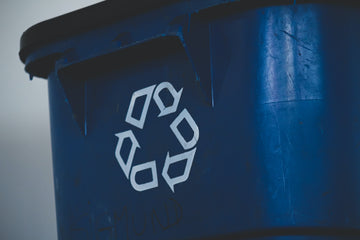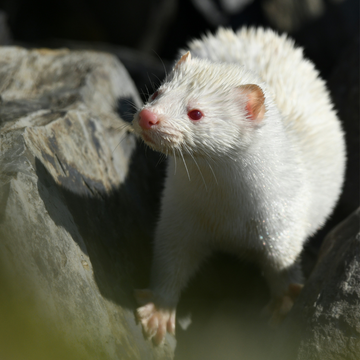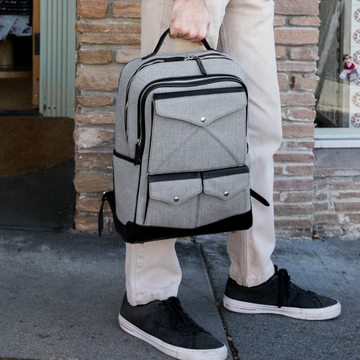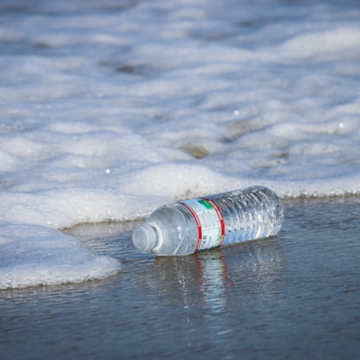Plastic and its impact on our environment
Plastic is an integral part of our day to day lives. The use of plastic has its roots deep down in the everyday things that we need for our survival.
These items include bottles for beverages, food containers, packaging tapes, toothbrushes, trash bags and the list goes on. The trend of using plastic has been high for quite sometime now - long time before people have ever heard of the words: “global warming” or “climate changes”.
As the demand has been high, businesses have been producing plastic in huge amounts without taking waste management and recycling into consideration. And today, the situation has come to a point where:
- CO2 is at a record level high “417 parts per million”.
- 2020 was “34.16 F hotter” than the average year in the 19th century.
- The Arctic freeze was “delayed by 2 months” in the year 2020. If the ice will form late, it will be thinner and melt quickly. The result could lead to fewer nutrients for Arctic plankton, thereby reducing the capacity to capture CO2 from atmosphere.
These numbers themselves are enough to explain the impact humans have made by disturbing the natural ecosystem of our environment. “Plastic waste” is just one of the many but significant reasons behind it.
A report depicts that 8.3 billion tonnes of plastic have been produced since the early 1950s. And 60% of the plastic produced has ended up either in oceans, lands and the natural environment, which is alarming.
The “Great Pacific Garbage Patch” is the best example to understand the scale of plastic pollution!

Need to Use Recycled Products Made of Plastic Bottle
Plastic can stay in our land and oceans for decades. Apart from spreading toxins into the oceans and important water bodies from where we extract water for drinking, it also affects the wildlife.
Let's see the picture below and let's imagine other animals getting stuck inside plastic or consuming it!

So, it becomes our responsibility to reverse the destruction and work towards the betterment of our environment - together, in a united fashion.
Plastic can not be decomposed. Thus, it is crucial to reduce the manufacturing of new plastic, by shifting towards other alternatives.
While we can’t completely stop the consumption of plastic (because of its usage across different packaging industries, for which we don’t have many alternatives). For a variety of every day/frequently used items, for example, apparels or accessories, we can switch to brands that make use of recycled plastic.
It takes approximately 10 plastic bottles to create a t-shirt, 63 to make a sweater and 114 to create a sleeping bag. So, if you buy a product made from recycled plastic, you are contributing towards the betterment of the environment.
At Luna Bags, we use recycled polyester (extracted from discarded plastic bottles) for the manufacturing of canvas body material of our designer vegan bags. We believe that if we continually develop products made from recycled plastic and consumers show a preference for these products, this will eventually discourage manufacturers to develop new plastic.
If we implement all these practices and the demand goes down, the profit of the companies make manufacturing new plastic will decrease, urging them to look for green solutions.
But what can we do at a personal level to reduce the imbalance we are regularly cause in our ecosystem? Let’s discuss it.
Steps to Gradually Establish the State of Balance in Our EcoSystem by Reducing Plastic Waste
- Stop using single use plastic - Such items include plastic water bottles, glasses, cups and plates. Use a reusable water bottle to drink water. When throwing gatherings for your friends and family please use dinnerware that can be washed or use compostable items.
- Recycle properly - Please sort through your daily use items at the end of its lifecyle and recycle them properly. Please don’t throw away items into the trash that can easily be recycled. Usually, city/county-provided recycle bins don’t accept plastic shopping bags. However, you can accumulate them and eventually take them to your local Trader Joe’s or Walgreens.
-
Clean up your surroundings/community - While traveling, don’t throw any plastic materials outside of your car window. In fact, take gloves and garbage bags along to collect solid plastic materials and put them into the blue recycling bin
on your way back.
Or you can gather your neighbors, friends or family members and clean up your community or places nearby where plastic waste is abundant. If you take one good step, people will follow. And with a group of people, you can make a significant impact in your locality or region.
- Use Items Built Made with from Recycled Plastic - A good number of brands these days are recycling plastic waste, specifically plastic bottles to produce consumer-grade goods. These include clothing materials, shoes, vegan bags, makeup products (packaging), chairs, etc. These items are sustainable and good for the environment, as we are recycling plastic that could have turned into waste.
- Less or No Use of Plastic Materials - We all know the relation between demand and supply. Lower demand for plastic will discourage the businesses producing it and urge them to look for better solutions. Thinking about how it is possible to use less or no plastic at all? Well, get started with the small things first. Use bamboo toothbrushes, eco-friendly tumblers and water bottles, carry jute bags for grocery or shopping, etc.
Conclusion
Looking at the current consumption of plastic, studies suggest that its production will double in the next 20 years and quadruple by 2050. It is alarming, both in terms of environmental and economic imbalance.
If you are here, you already know the impact of plastic use on the environment. But if looked upon carefully, plastic waste also leads to a huge loss of energy and money as well.
You must be thinking how?
Well, manufacturing plastic costs 88% more than recycling. So, recycling discarded plastic bottles can be a profitable deal for businesses too!
Finally, to provide a healthy future to for our next generations, we must act as responsible citizens, listen to what scientists are saying and follow the best practices. Recycling is one among them. Hence, don’t waste instead save our environment and inspire others to do the same.






